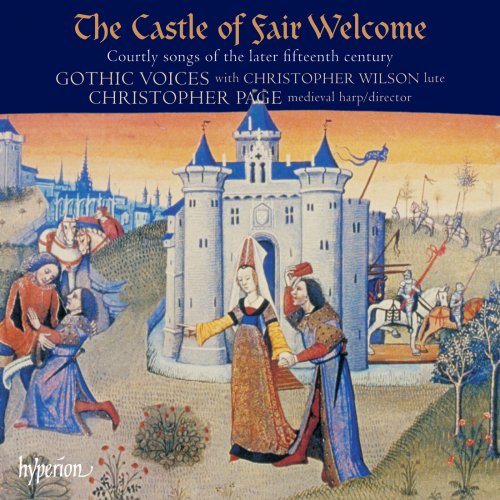
Gothic Voices, Christopher Page - The Castle of Fair Welcome: Courtly Songs of the Later 15th Century (1987)
BAND/ARTIST: Gothic Voices, Christopher Page
- Title: The Castle of Fair Welcome: Courtly Songs of the Later 15th Century
- Year Of Release: 1987
- Label: Hyperion
- Genre: Classical
- Quality: flac lossless (tracks) +Booklet
- Total Time: 00:47:03
- Total Size: 186 mb
- WebSite: Album Preview
Tracklist
01. Le souvenir de vous me tue
02. Puisque ma damme / Je m'en voy
03. Las je ne puis plus nullement durer
04. Que pourroit plus
05. Myn hertis lust
06. Dueil angoisseux
07. Ne je ne dors ne je ne veuille
08. En amours n'a si non bien
09. La pena sin ser sabida
10. Mi ut re ut "Venise"
11. Plus j'ay le monde regardé
12. So ys emprinted
13. Ma dame, trop vous mesprenés
14. Pues serviçio vos desplaze
After courteous words with the porter at the gate Sir Gawayn will pass under the portcullis of this castle, ‘shimmering between the sheer oaks’, and then disappear into the maze of a great household. On every side he will find ‘chambers with hearths where charcoal burns’ and courtyards noisy with hurrying chaplains as candles are lit in the galleries.
This recording presents some of the music which could be heard in some royal and noble households during the fifteenth century. Most of the composers represented enjoyed the highest patronage available to a fifteenth-century musician. The Englishman Robert Morton, whose rondeau Le souvenir de vous me tue is one of the most beguiling medieval songs, was a chaplain in the employ of Philip the Good and Charles the Bold, Dukes of Burgundy. (Charles was an accomplished composer in his own right, to judge by Ma dame, trop vous mesprenés). Gilles de Binche, called Binchois, was also one of Philip’s chaplains, and the outstanding composer of the period, Guillaume Dufay, may also have had some connection with the Burgundian court; otherwise his patrons included the Malatesta family at Pesaro and later Duke Amadeus VIII of Savoy.
Within a castle complex, songs and instrumental pieces like those recorded here were often performed in the grande salle, or Great Hall, especially when the main daily meals of disner and souper were elaborated for festivities at Christmas, Easter and Pentecost. As the Hall filled with ‘such a great wealth of knights and ladies that it was wondrous to behold’ there might be young squires waiting to be dubbed or to be presented with prizes for victory in the lists. These ceremonies were graced by music—and sometimes by polyphonic songs to judge by a revealing passage in the fifteenth-century romance of Cleriadus et Meliadice where we find the hero performing a rondeau in a French salle, ‘the best and finest ever built’, during the celebrations after a tournament...
01. Le souvenir de vous me tue
02. Puisque ma damme / Je m'en voy
03. Las je ne puis plus nullement durer
04. Que pourroit plus
05. Myn hertis lust
06. Dueil angoisseux
07. Ne je ne dors ne je ne veuille
08. En amours n'a si non bien
09. La pena sin ser sabida
10. Mi ut re ut "Venise"
11. Plus j'ay le monde regardé
12. So ys emprinted
13. Ma dame, trop vous mesprenés
14. Pues serviçio vos desplaze
After courteous words with the porter at the gate Sir Gawayn will pass under the portcullis of this castle, ‘shimmering between the sheer oaks’, and then disappear into the maze of a great household. On every side he will find ‘chambers with hearths where charcoal burns’ and courtyards noisy with hurrying chaplains as candles are lit in the galleries.
This recording presents some of the music which could be heard in some royal and noble households during the fifteenth century. Most of the composers represented enjoyed the highest patronage available to a fifteenth-century musician. The Englishman Robert Morton, whose rondeau Le souvenir de vous me tue is one of the most beguiling medieval songs, was a chaplain in the employ of Philip the Good and Charles the Bold, Dukes of Burgundy. (Charles was an accomplished composer in his own right, to judge by Ma dame, trop vous mesprenés). Gilles de Binche, called Binchois, was also one of Philip’s chaplains, and the outstanding composer of the period, Guillaume Dufay, may also have had some connection with the Burgundian court; otherwise his patrons included the Malatesta family at Pesaro and later Duke Amadeus VIII of Savoy.
Within a castle complex, songs and instrumental pieces like those recorded here were often performed in the grande salle, or Great Hall, especially when the main daily meals of disner and souper were elaborated for festivities at Christmas, Easter and Pentecost. As the Hall filled with ‘such a great wealth of knights and ladies that it was wondrous to behold’ there might be young squires waiting to be dubbed or to be presented with prizes for victory in the lists. These ceremonies were graced by music—and sometimes by polyphonic songs to judge by a revealing passage in the fifteenth-century romance of Cleriadus et Meliadice where we find the hero performing a rondeau in a French salle, ‘the best and finest ever built’, during the celebrations after a tournament...
As a ISRA.CLOUD's PREMIUM member you will have the following benefits:
- Unlimited high speed downloads
- Download directly without waiting time
- Unlimited parallel downloads
- Support for download accelerators
- No advertising
- Resume broken downloads


